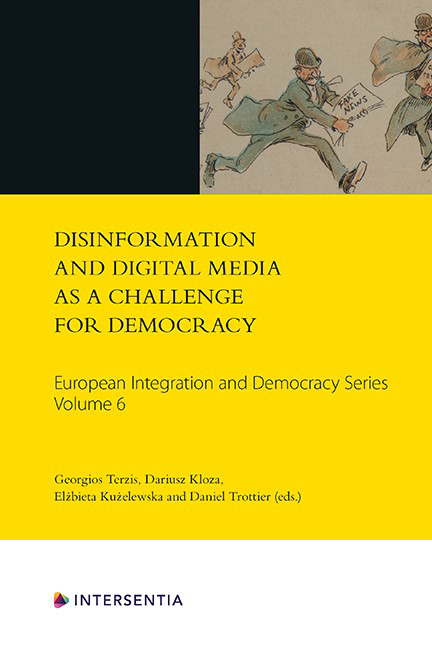Book contents
- Frontmatter
- Foreword: Fooling All of the People All of the Time: Democracy in the Age of Fake News
- Introduction: ‘They All Hear “Ping” at the Same Time’
- Contents
- List of Abbreviations
- List of Contributors
- PART I THEORETICAL APPROACHES TO AND THE CONCEPTUALISATION OF DISINFORMATION
- PART II EXPERIENCE OF DEALING WITH DISINFORMATION
- PART III SOLUTIONS TO DEAL WITH DISINFORMATION AND THEIR CRITIQUE
15 - Fighting Online Disinformation: Did the EU Code of Practice Forget about Freedom of Expression?
Published online by Cambridge University Press: 26 May 2021
- Frontmatter
- Foreword: Fooling All of the People All of the Time: Democracy in the Age of Fake News
- Introduction: ‘They All Hear “Ping” at the Same Time’
- Contents
- List of Abbreviations
- List of Contributors
- PART I THEORETICAL APPROACHES TO AND THE CONCEPTUALISATION OF DISINFORMATION
- PART II EXPERIENCE OF DEALING WITH DISINFORMATION
- PART III SOLUTIONS TO DEAL WITH DISINFORMATION AND THEIR CRITIQUE
Summary
INTRODUCTION
The problem of disinformation online is a source of growing concern for EU policy-makers. During the political events of 2016, it became clear that the spreading of so-called ‘fake news’ can create risks to democratic political processes, including the integrity of elections. With EU elections on the way, policy-makers attempted to mitigate these risks as quickly as possible. In early 2018, the EU Commission set up a new High-Level Expert Group (HLEG) on Fake News and Online Disinformation to advise the Commission on the phenomenon of disinformation, defining the roles and responsibilities of stakeholders, and formulating recommendations. The HLEG released its final Report in March 2018. Next, in May 2018, the Commission released a Communication ‘Tackling online disinformation: a European approach’. Both documents set a number of goals ranging from enhanced transparency in political advertising to the closure of fake accounts, the demonetisation of purveyors of disinformation and the promotion of media literacy. Moreover, the HLEG invited the European Commission to promote a general, Europewide Code of Practice as a multi-stakeholder approach. In September 2018, the European Commission published the Code of Practice on Disinformation (hereinafter ‘the Code’ ).
The Code is described as a voluntary, self-regulatory mechanism agreed on by representatives of online platforms, leading social networks, advertisers and advertising industry. The Code observes that the dissemination of disinformation is facilitated by and impacts a broad segment of actors in the ecosystem. For this reason, all stakeholders have roles to play in countering the spread of disinformation.
The purpose of the Code is to identify actions that the signatories could put in place in order to address the challenges posed by disinformation online. The EU policy-makers define ‘disinformation’ as ‘verifiably false or misleading information’ which is both ‘created, presented and disseminated for economic gain or to intentionally deceive the public’ and may cause public harm, intended as ‘threats to democratic political and policymaking processes as well as public goods such as the protection of EU citizens’ health, the environment or security’.
- Type
- Chapter
- Information
- Disinformation and Digital Media as a Challenge for Democracy , pp. 291 - 308Publisher: IntersentiaPrint publication year: 2020
- 6
- Cited by

